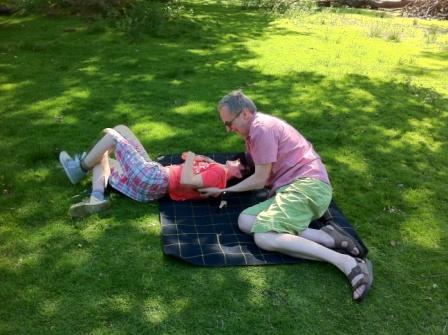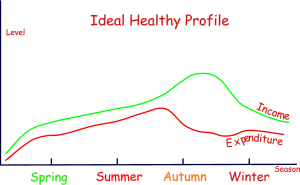
Have you seen a movie called ‘When Sally met Harry’; if not, go see it! Apart from it being one of my all-time favourites I recently had an occasion to remember a conversation between Harry and Sally that went something like this:
Sally: One day soon I’ll be forty and my clock is ticking. I want to have children.
Harry: You’ll be forty in ten years!
Sally: I know! It is not the same for men, though. Charlie Chaplin had children when he was seventy!
Harry: But he was too old to pick them up!
As it often happens in life, the reason I remembered this conversation was because of a chat I was having with my hairdresser: a guy my age, who’s been cutting my hair for thirteen years and during that time we have become rather close. Last time I saw him, somehow we got into the following:
H: Maria, could you imagine having children in your 20s? Because I can’t!
M: No, I can’t either. Many would say that we had our son late but I think for me it was exactly right: I had him when I had stopped lusting after night clubs and had given up chasing men.
True; about the night clubs at least (chasing men was never my thing, btw). But this made me consider our situation: our youngest son is twelve, I am fifty and John is sixty. For all reasons and purposes we belong to the new and getting larger group of ‘parensioner’: a new word referring to people who look after young children when they are retired.
In fact, a recent study found that:
- Almost a million adults in the UK are parensioners;
- A third of men who are parensioners were between 50-70 years old when their children were born;
- A quarter of parensioners will have children who are 15 years old (or younger) when they reach retirement age;
- Retirement coincides with the most expensive period of raising a child – attending university.
This has clear implications for personal finance management. These will be probably easier to set out using The Money Principle financial profiles.
Remember, that to create a tool for considering personal finances throughout life rather than as a snap shot of today, I discussed different strategies during four seasons of life, namely Spring, Summer, Autumn and Winter?
This is the ideal profile I came up with at the time; this assumes that child rearing happens in people’s summer, or between the ages of 30 and 50.

Now, when one is a parensioner this profile needs to change. Delayed child rearing affect people’s life time personal finance profile in two major ways:
- Scenario 1: Cash flow is relatively low in Summer and savings and investments don’t increase. This is not because of raising children and paying off liabilities but because of…living. Cash flow can’t increase dramatically during Autumn because of child related expenses. As a consequence, retirement will be either severely delayed or really uncomfortable.
- Scenario 2: The rather bulging cash flow moves from Autumn to Summer; it is mostly invested and generates a nice, healthy passive income during Autumn when children are raised. This will make for a healthy personal finance profile where retirement – even early retirement – is possible and children can grow up with security and care.
Our experience
Of course there are financial implications of having children later in life but I find that having children is always a matter of ‘jumping into the unknown’. Having children earlier may not be such a bright idea either: I was certainly not ready in my twenties and many friends I’ve discussed the matter with were not either.
What are the advantages of having children later in life? Here are some in no particular order:
- You have got all the ‘wild’ stuff out of your system;
- You can focus on the needs of the child;
- You are established enough to be able to choose your child when necessary (when I was pregnant and couldn’t travel my collaborators from around the world came to see me);
- You have time to attend your child’s events (John regularly watches cricket matches, rugby games etc.);
- You can be there for you child and have more patience and understanding;
- You are more settled and divorce is less likely (John and I had been together for seven years when we had our son);
- You are generally wealthier (though this may vary depending on circumstance).
- You have learned how to preserve your energy; so there is plenty to go around in a controlled way.
There are negatives as well:
- You may get ill or die while your children are young (this is why we are very well insured);
- You may damage your retirement (who needs retirement when there is so much to do);
- You may not be able to support your child to the level expected (in which case expectations should be revised).
I realise that we are probably not a typical case, but our experience with being parensioners is very positive so far; we are doing well financially, career-wise, we are building businesses and I’ll be able to stop being employed in five years were this what I wish to do (be financially independent).
Our youngest son is bright, socially able and very well adjusted. He is doing exceptionally well at school, he loves learning and knowledge and he is good at sports. Even more importantly, he knows that he is the centre of the universe for his parents; which is exactly why we are teaching him that he is part of the universe albeit an important one.
He’ll be OK. When he is seventeen it will be his choice whether he joins me on my motorcycle trip around the US – for now he doesn’t want to be on a motorbike but with John in an air-conditioned, large and comfortable car. We’ll see!
Do you think there is ‘right’ time to have children and when is it?
I couldn’t imagine having kids in my 20’s knowing what I know now. Although I would love the same energy I had back then.
@Jai: As I said, neither do I; and the first several months are tiring regardless one’s age…
There are definitely some more disadvantages to having kids later:
– You don’t have as much natural energy. You may know how to preserve it, but it’s not as plentiful
– You may have less of an ability to relate to your child
– Your peer group will be less likely to have children of the same age
– Health implications of the child (higher risk of a disability, child being born premature)
– Health implications of yourself (high likelihood of not being able to conceive, much more difficult pregnancy)
– Potential inability to give child a sibling
– Child still being in your home when you are retired = much like paying a mortgage when you are retired – you can’t downsize
But I think it really just depends on the person. I think many of the advantages you listed can also apply to younger parents (in their late 20s early 30s) – ie wildness (many people go through that stage in teenagehood, and being there for the child.
I don’t think one is better than the other, but I plan on being a younger parent so that I can have more than one child. My family has fertility issues after 30.
@SaburbanFinance: There is a lot of mythology about aging. What I am finding is (then again, it may be only me) that do far my energy level are unchanged and if anything I am amazed that many of my much younger colleagues run out of steam so much faster than me. And I run marathons dreaming of running and ultra…
Probably the time will come when my energy levels will go down but looking at John this is probably quite a way off yet.
Oh, and since women generally have children older now I have to say that I had a wonderful circle of ‘baby’ friend – with very few exceptions they were my age.
All I am saying is people have to have the right to decide – given the opportunity most women know when the time has come to have a child (or not).
I think the right time to have children is individual! The parent should be mature enough, psychologically and financially ready. That can happen at any age! The larger problem is will the relationship or marriage last? Since 50% of marriages in the U.S. fail, the bigger problem is single parent families. Some of the same elements that is important to have for having children is also important for marriage too. We have more hurdles to get a driver’s license than a marriage license.
@Krant: Agree that stability is more important than age; would you say that when people are together after their ‘demon’ has set it is less likely to split up? I think so.
There is no right or wrong time to have kids. My friends with older parents lament a few things: they can’t go hike or play football with their parents, they get tired (they don’t run marathons!), one was a bit worried that his parents would be retired before he even entered the workforce, the last got married and had kids very early so her mum would meet them and now she passed so she is a bit sad she can’t share the grandkids with her.
But you can become a parent at 20 and die at 25 too.
I don’t know if/when I’ll have kids but I am glad I lived my 20s freely.
@Pauline: There are always exceptions but also the way in which people live is changing – we last longer :).
While I’d never lay “the ideal age” on anyone, our decision to have kids while we were young was on purpose:
– We kew we’d struggle with money, some, but that wouldn’t be bad. Learning to live with less made us both stronger.
– We wanted to enjoy our kids when they were adults. My parents are young and as I age they become more like “friends” than “parents.” I like that.
– We also wanted our prime earning years to be kid-free so we could focus on that, travel, and whatever else we wanted. Sadly, this discounted the concept of compounding interest, but we’ve gotten through it okay!
@AverageJoe: You know I think that compound interest is over-rated :). We had our son late partly because I was not ready and second I had mechanical infertility problems. We’ll keep young.
My parents were much older when they raised my younger brother, which I think allowed for a little more perspective. Financially, compounded interest certainly was a factor.
@Mike: Yeah, it is different. Our son is in similar situation – he has two much older brothers who think the world of him and discipline him in their brotherly ways :).